More than a month before the April launch of her White House run, Hillary Clinton stood before a swarm of reporters at the United Nations headquarters and dealt with questions about her use of private emails for official business. It is an issue that has dogged her candidacy ever since.
Few doubted until this summer that Clinton, with vast institutional and popular support and little competition, would cruise to her coronation as the Democratic nominee for the presidency.
But many of her statements from those first defensive days have been proven false by a steady stream revelations from three congressional committees and four federal agencies investigating her use of a private email server. Just as damaging have been dozens of lawsuits pursued under the Freedom of Information Act, which have shown gaps in the batches of emails Clinton gave the State Department last year.
Despite raising more than four times as much campaign cash than her closest opponent, Clinton has seen her lead in the polls in Iowa and New Hampshire either shrink or vaporize entirely under the media scrutiny that has followed every twist in the email controversy.
Related Story: http://www.washingtonexaminer.com/article/2573390
Vice President Joe Biden, among other Democrats, is clearly wondering whether he should step into the race to provide the party with a more electable alternative than socialist Sen. Bernie Sanders. And Clinton’s own supporters are questioning whether she can find a way to navigate a classic controversy in the age of Twitter.
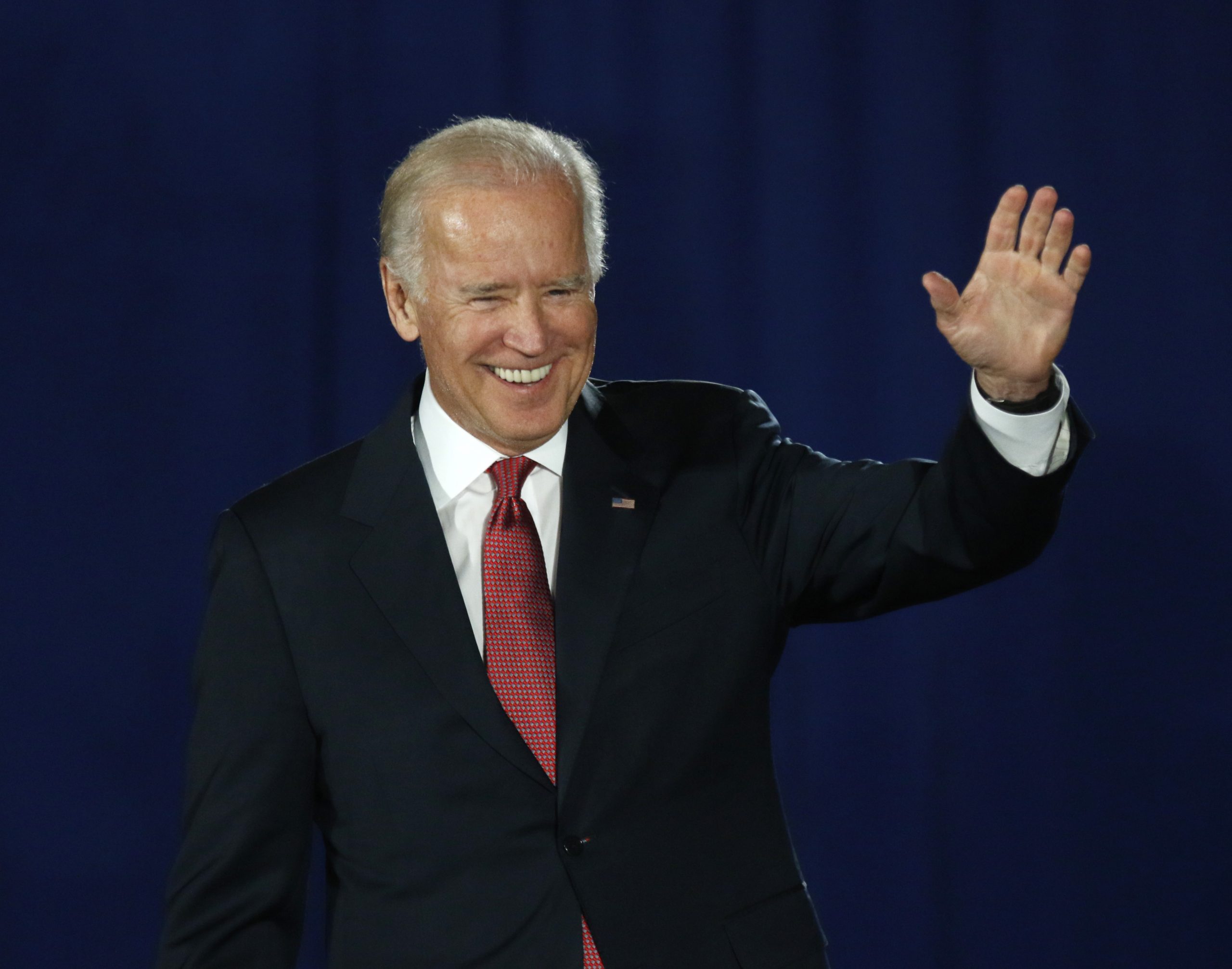
Vice President Joe Biden, among other Democrats, is clearly wondering whether he should step into the race to provide the party with a more electable alternative than socialist Sen. Bernie Sanders. (AP Photo)
Any attempts to change the conversation will inevitably fail against because of an inexorable process set in motion by a court, which ordered that her emails be published in batches at the end of every month until January 2016, the eve of the Iowa caucuses and New Hampshire primary. No matter what shiny objects the campaign waves in front of reporters, end-of-the-month email dumps from the State Department refresh the idea of Hillary being tricky and deceptive.
As the State Department hits her campaign again and again on the bruise of scandal, and as official investigations expand to include the emails of her closest aides, Clinton’s ability to allay her supporters’ concerns could dwindle in tandem with her falling poll numbers.
Clinton’s media tug-of-war
Since the summer, the Clinton campaign has worked haplessly to distract the public with policy announcements and events. On Aug. 10, Clinton finally responded to a federal court’s request that she certify, under penalty of perjury, that she had turned over all work-related documents to the State Department. That same day, her team blanketed the media with details of a progressive plan to alleviate college debt by restructuring tuition loans.
Two days later, the FBI revealed it had taken Clinton’s email server into custody and confiscated all copies of her emails due to concerns that some of the material was classified. The college loan plan was quickly banished from headlines as reporters scrambled to learn more about the FBI investigation.
On Aug. 27, a Quinnipiac poll revealed Clinton’s unfavorable ratings had hit an all-time high. The sobering numbers broke as the first of many stories about a potential Biden bid began to surface. On Aug. 28, Clinton tried to cut through the noise with a bold statement, made during a speech in Cleveland, in which she compared pro-life Republicans to “terrorist groups.” The sensational comments, and the resolutely pro-abortion stance, managed to eclipse the email story for just one day. Another batch of her emails was released by the State Department the following Monday, drawing attention back to the unresolved issue of her private server.
It’s a pattern that has persisted throughout Clinton’s campaign: a constant struggle to supplant negative narratives with positive ones as a parade of email revelations tumbles out of federal agencies, courts, congressional committees and independent researchers.
The House Select Committee on Benghazi, the investigative panel responsible for exposing the email scandal, subpoenaed Sidney Blumenthal for a transcribed interview June 16. Blumenthal, a divisive former aide to Clinton who was banished from the administration by Obama’s staff, had recently been exposed as an informal adviser to Clinton on foreign policy in Libya. His appearance before the committee, and private emails between him and Clinton that were leaked to the press within a day of his interview, amplified criticism of the Clintonian insider network that allowed him to play such a prominent role during her State Department tenure.
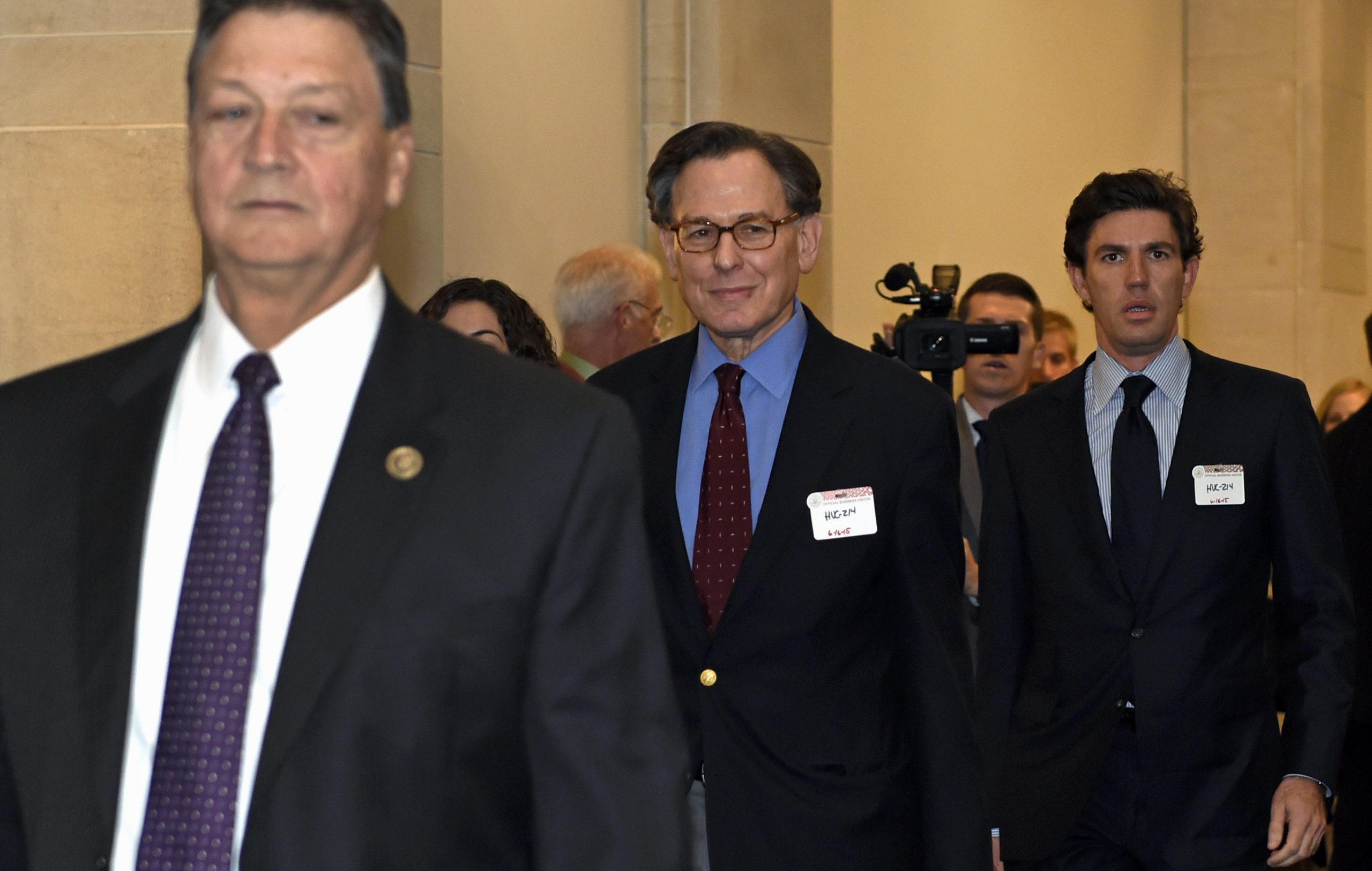
Sidney Blumenthal, a longtime confidant to Hillary Clinton, center, arrives on Capitol Hill to face questions from the Republican-led House panel investigating the deadly 2012 attacks in Benghazi, Libya. (AP Photo)
On June 17, the day after Blumenthal’s deposition, Clinton rolled out a plan to address youth unemployment with apprenticeships. But within a week, this pivot to policy foundered on the discovery that Blumenthal had given the select committee 15 Benghazi-related emails that Clinton had failed to provide to the State Department. This revived questions about whether Clinton had filtered her records for anything that might embarrass her campaign before handing them to the government last year. It also focused additional scrutiny on emails released at the end of June.
Clinton’s image took another hit July 23, when The New York Times reported two inspectors general had referred her use of a private server to the Justice Department for a criminal investigation. Her campaign quickly and forcefully disputed the story. On July 24, a Friday, Clinton announced her plan for a sharp hike in capital gains taxes. The following Monday, she laid out her ambitious plan to address climate change during a campaign appearance in Des Moines. Those policies, like others before and since, fell to the wayside as the end of July approached and the media eagerly awaited the latest trove from Clinton’s inbox and sent-mail files.
Shifting strategies
Clinton’s initial approach to the email controversy, hunker down until the story blows over, contrasts starkly with the proactive strategy she has adopted to smother other scandals.
Cartney McCracken, a Democratic strategist, said Clinton’s campaign could help itself by confronting questions about “emailmageddon.”
“At a time when Clinton’s trustworthiness is in question, getting no response or a very slow response from her campaign creates a bigger perception of guilt in voters’ eyes,” McCracken told the Washington Examiner. “Her campaign is taking on big issues, like opposing the Keystone Pipeline, but voters aren’t paying attention because there’s a much bigger elephant in the room that needs to be addressed.”
The response from Clinton and her allies has, in some part, relied on a measured attack against the investigative body that brought her email use to light in the first place: the House Select Committee on Benghazi. Clinton’s supporters continue to paint the select committee’s probe as a redundant investigation that has deterioriated into a dirt-digging mission designed to damage the Democratic frontrunner.
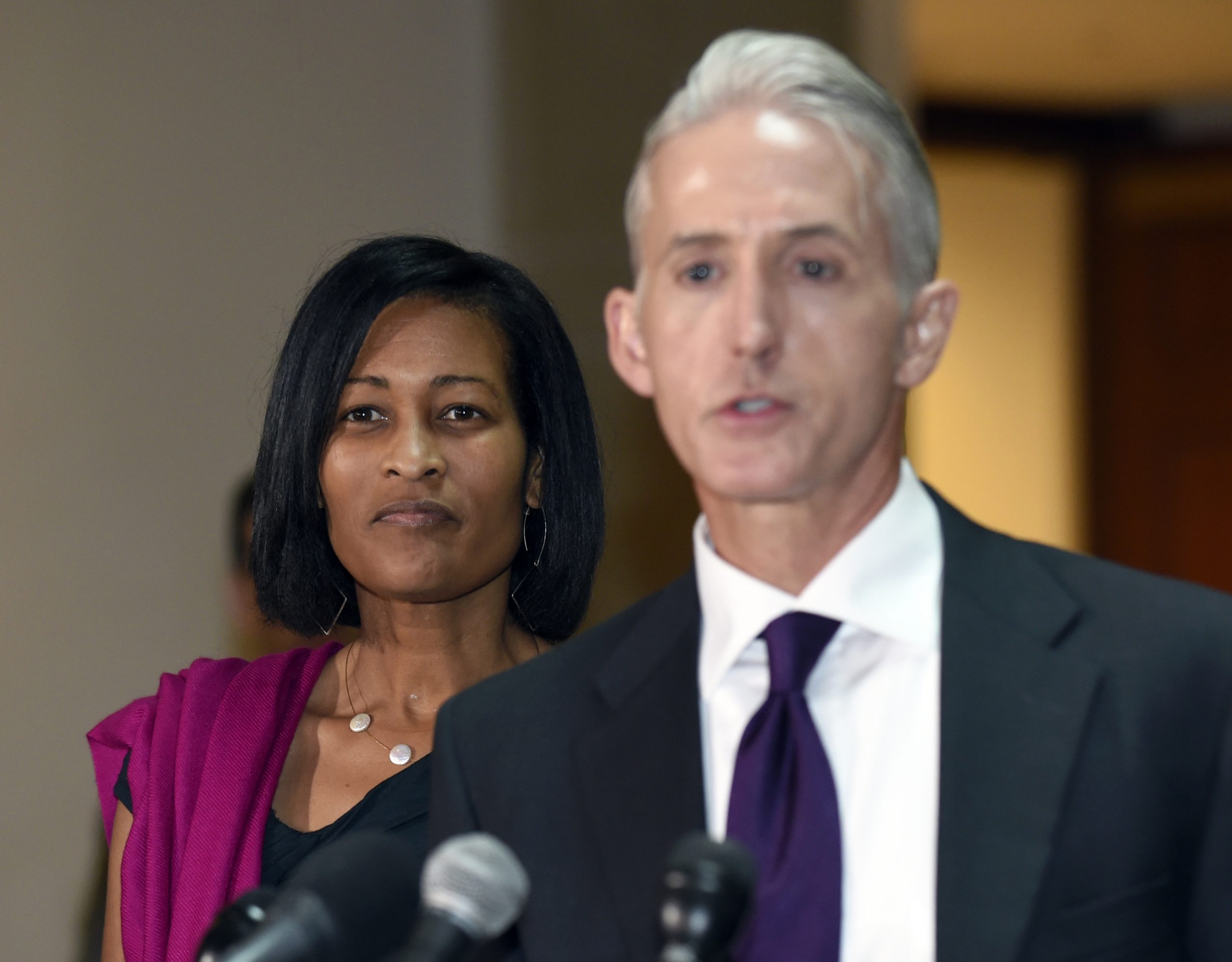
Former Hillary Clinton aide Cheryl Mills, left, listens as House Select Committee on Benghazi Chairman Trey Gowdy, R-S.C., right, speaks to reporters following her deposition before the panel investigating Benghazi. (AP Photo)
The Senate Judiciary Committee and the Senate Homeland Security Committee have both seized on aspects of the email case in their own lines of inquiry. The three congressional committees ran into a stumbling block last month when a key witness, Bryan Pagliano, invoked his Fifth Amendment right to remain silent. This forced the committees to grapple with the possibility of seeking a rare congressional immunity deal to encourage Pagliano’s cooperation.
Andrew Herman, a government ethics attorney with Miller & Chevalier, said members of Congress are “treading into dangerous waters” when they start to get involved with a criminal investigation.
“This is a toxic mix of presidential politics and the partisan divide, and it’s fascinating,” Herman said. “There’s so many moving parts.”
He noted Congress’ “investigative ability” is limited because its oversight tools are “fairly blunt.”
As congressional investigators have uncovered bits and pieces of the circumstances surrounding Clinton’s private emails, the Democratic candidate’s strategy has included denying the relevance of any new information. No matter the revelation, Clinton sticks to her assertion that everything she did was “allowed.”
Ford O’Connell, a Republican strategist, said the controversy is “just something that is never going to go away.”
“The email situation doesn’t really bother Democrats. What bothers Democrats about the whole situation is that she just fumbles it every single time,” O’Connell said. “It’s the optics of it. Every time she says something, it becomes untrue three weeks later.”
O’Connell said the email story will dissipate only if the drip-drip of new information suddenly stopped and the facts were allowed to stand as they are today. He said there is also a possibility that Republicans, as the main drivers of the scandal narrative, could overplay their hand.
But many people agree that the email problems do not necessarily spell disaster for Clinton’s campaign.
Jamal Simmons, a Democratic consultant, said Clinton is entirely capable of untangling herself from the controversy.
“She’s a strong, well-staffed candidate. If anybody can overcome issues like these, it’s Hillary Clinton,” Simmons said.
Since Clinton has entered public life, she and her husband have weathered at least a dozen scandals of varying sizes by waiting out the public’s attention span. Her survival tactics have included obscuring the details of a controversy in technical minutiae, a strategy she has employed to mask the deceptive nature of her server by citing federal regulations that permitted its use.
As O’Connell noted, the absence of new information and the aggressive repetition of existing information could test voters’ appetite for the truth in the email scandal. From IRS targeting to Islamic State beheadings, the public can seemingly tire of any story if the flow of fresh details ends.
Clinton surrogates seem to be exploiting that reality, with some remarking in unision on Sept. 27 that questions about their candidate’s emails have been “asked and answered” and that it is “time to move on.”
Plummeting in the polls
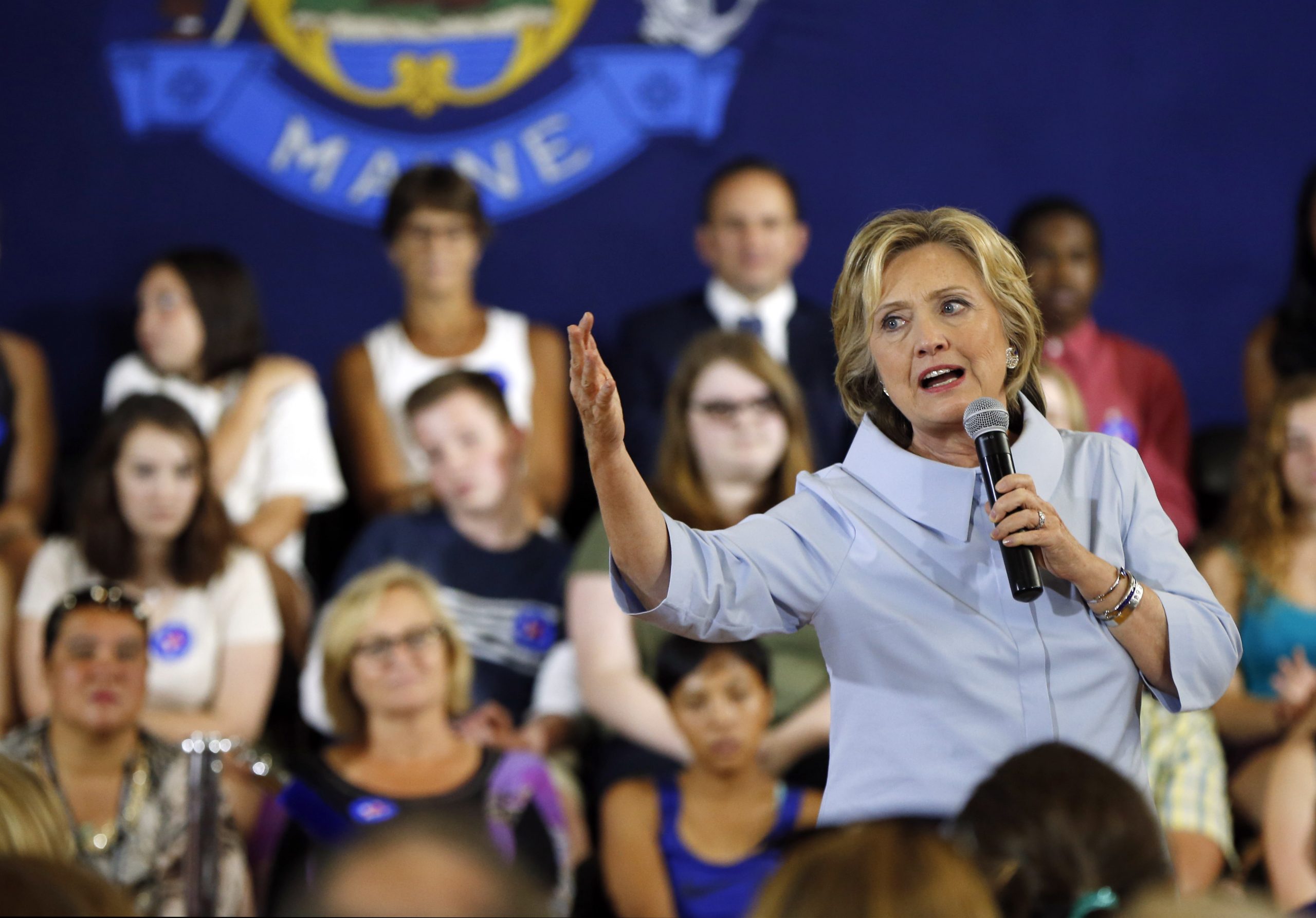
Hillary Clinton has put on her usual show of confidence and strained mirth when asked about her dwindling support. (AP Photo)
The controversy over Clinton’s emails has toppled her once-towering lead over fellow Democrats. Her struggles preceded a surprise surge in support for Sanders, who picked up steam this summer as Clinton lost it.
Nationally, she leads Sanders by 15 points, according to an NBC/Wall Street Journal poll released Sept. 27. Just three months earlier the gap was 60 points.
The RealClearPolitics average of major polls paints an even bleaker picture for Clinton, placing her nationwide lead at 13.2 points.
A chart illustrating her poll numbers shows a line that hovered near the top of the graph until her campaign launch, at which point it angles sharply toward the bottom of the page, as if the person drawing the line fell asleep with the pen in his hand. By contrast, lines representing Sanders and Biden, the latter of whom is not even in the race, have inched steadily upward.
Clinton has put on her usual show of confidence and strained mirth when asked about her dwindling support, acknowledging only that campaigns have an ebb and flow.
In Iowa, she leads by an average of 5.2 points. A Quinnipiac poll from early September found Sanders had crept up to just a single point behind her in the Hawkeye state. And he has completely left her in the dust in New Hampshire, opening double-digit leads in two recent polls and an 11.2 percent average lead.
Pundits argue that Clinton can lose Iowa and New Hampshire and still win the Democratic nomination handily, highlighting Sanders’ weaknesses as a general election candidate and the uphill battle Biden might face with such a late entry into the race.

Polls show Democratic presidential candidate Sen. Bernie Sanders within striking distance of Clinton in Iowa, and taking the lead in New Hampshire. (AP Photo)
But the only narratives emerging to replace the email controversy involve a pair of humiliating primary defeats at the hands of a candidate once regarded as a joke and the implications of a white-knight challenge from a sunny and widely liked vice president.
Changing the story
Clinton’s efforts to bring the media’s focus back to her progressive message have been hampered not just by Republicans in Congress and by leaks from the executive branch, but also by contentious court cases over the Freedom of Information Act.
Federal judges have emerged as some of her harshest critics, forcing the State Department to divulge documents the agency has spent months keeping from Congress. Presumably free from the same political pressures that govern the actions of congressional investigators and the Obama administration, courts have still come down hard against the email arrangement that allowed thousands of federal records to slip out of the government’s hands. A FOIA victory is responsible for the release of Clinton’s emails in batches until January. The Iowa caucuses take place in early February, mere days after Clinton’s final email release.
Tom Fitton, president of Judicial Watch, said cases like the one brought by his conservative watchdog group are keeping the email story alive.
“From our perspective, the courts are the vehicle” for getting answers, Fitton said.
“I think there’s significant criminal conduct that has to be reckoned with by Mrs. Clinton — a refusal to disclose, her lies, lack of transparency, and corruption at the State Department is somewhat overwhelming.”
Other groups, including Citizens United, have dragged documents out of the State Department that shed light on Clinton’s close ties to the Clinton Foundation and the business activities of her top aides. But the outrage over her private email use is so focused on the elaborate methods she employed to shield her communications that the content of those emails almost doesn’t matter.
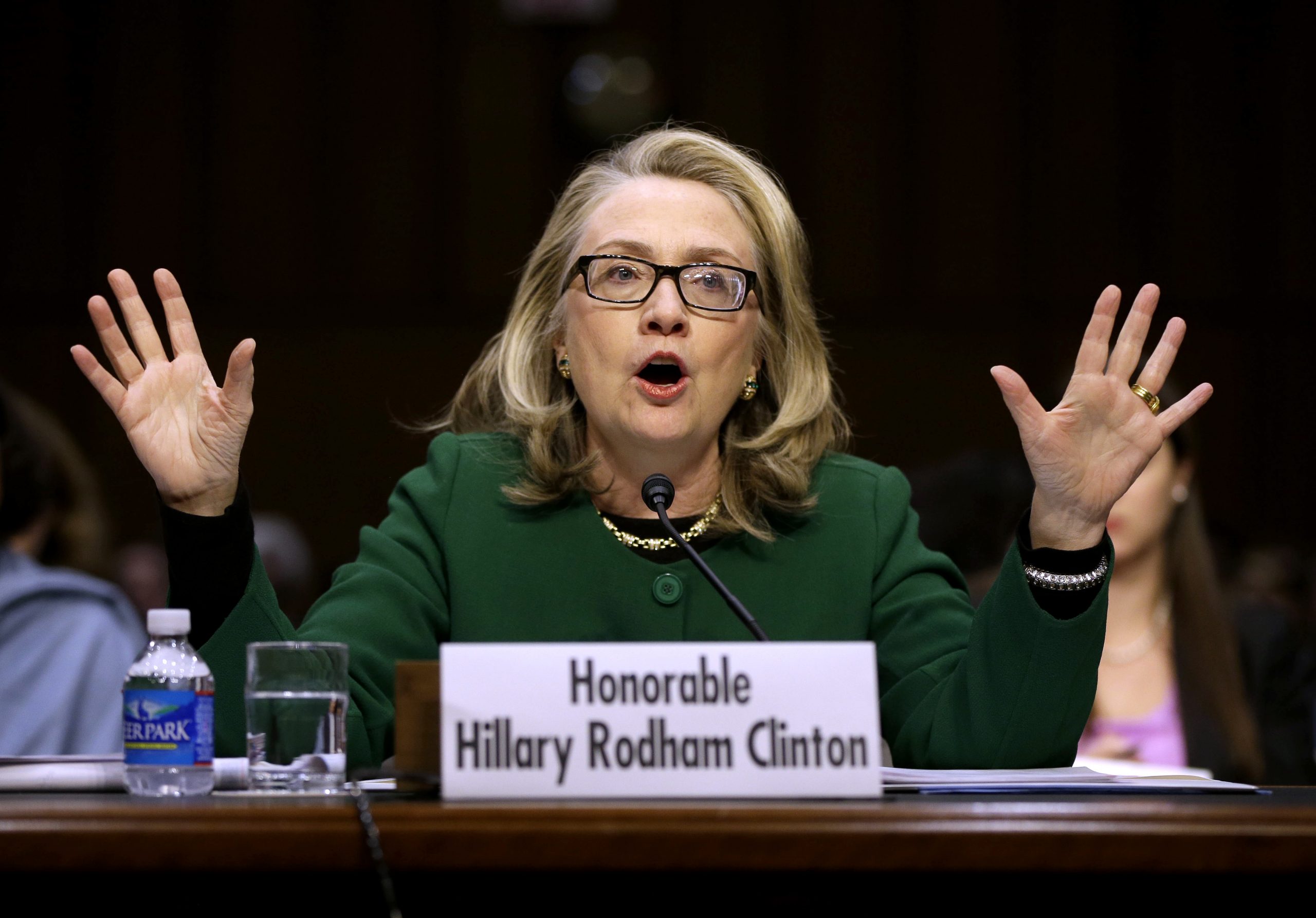
Secretary of State Hillary Clinton testifies before the Senate Foreign Relations Committee hearing on the deadly September attack on the U.S. diplomatic mission in Benghazi, Libya. (AP Photo)
Critics are quick to point out as well that Clinton deleted one email for each one she turned over by claiming they were of a personal nature, rendering the collection available for release a thoroughly sanitized version of the full record.
For Clinton to overcome her email troubles, the “drip-drip-drip” nature of the scandal, which she herself has acknowledged, must end early enough for her to put time and space between the controversy and the day voters head to the polls. Her pivot to a more proactive approach to the questions swirling around her emails has given her supporters hope that she can emerge from the scandal fighting fit. But the steady flow of new details still has more Democrats wondering whether that is possible.
This article appears in the Oct. 5 edition of the Washington Examiner magazine.
